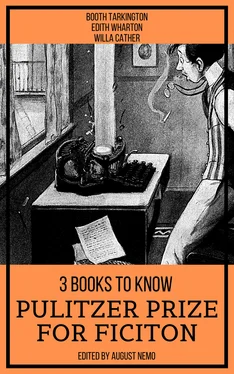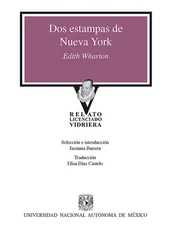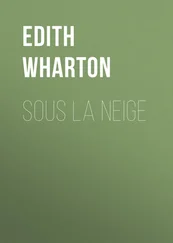“You say—you say that people believe—” George shuddered, then forced himself to continue, in a sick voice: “They believe my mother is—is in love with that man?”
“Of course!”
“And because he comes here—and they see her with him driving—and all that—they think they were right when they said she was in—in love with him before—before my father died?”
She looked at him gravely with her eyes now dry between their reddened lids. “Why, George,” she said, gently, “don't you know that's what they say? You must know that everybody in town thinks they're going to be married very soon.”
George uttered an incoherent cry; and sections of him appeared to writhe. He was upon the verge of actual nausea.
“You know it!” Fanny cried, getting up. “You don't think I'd have spoken of it to you unless I was sure you knew it?” Her voice was wholly genuine, as it had been throughout the wretched interview: Fanny's sincerity was unquestionable. “George, I wouldn't have told you, if you didn't know. What other reason could you have for treating Eugene as you did, or for refusing to speak to them like that a while ago in the yard? Somebody must have told you?”
“Who told you?” he said.
“What?”
“Who told you there was talk? Where is this talk? Where does it come from? Who does it?”
“Why, I suppose pretty much everybody,” she said. “I know it must be pretty general.”
“Who said so?”
“What?”
George stepped close to her. “You say people don't speak to a person of gossip about that person's family. Well, how did you hear it, then? How did you get hold of it? Answer me!”
Fanny looked thoughtful. “Well, of course nobody not one's most intimate friends would speak to them about such things, and then only in the kindest, most considerate way.”
“Who's spoken of it to you in any way at all?” George demanded.
“Why—” Fanny hesitated.
“You answer me!”
“I hardly think it would be fair to give names.”
“Look here,” said George. “One of your most intimate friends is that mother of Charlie Johnson's, for instance. Has she ever mentioned this to you? You say everybody is talking. Is she one?”
“Oh, she may have intimated—”
“I'm asking you: Has she ever spoken of it to you?”
“She's a very kind, discreet woman, George; but she may have intimated—”
George had a sudden intuition, as there flickered into his mind the picture of a street-crossing and two absorbed ladies almost run down by a fast horse. “You and she have been talking about it to-day!” he cried. “You were talking about it with her not two hours ago. Do you deny it?”
“I—”
“Do you deny it?”
“No!”
“All right,” said George. “That's enough!”
She caught at his arm as he turned away. “What are you going to do, George?”
“I'll not talk about it, now,” he said heavily. “I think you've done a good deal for one day, Aunt Fanny!”
And Fanny, seeing the passion in his face, began to be alarmed. She tried to retain possession of the black velvet sleeve which her fingers had clutched, and he suffered her to do so, but used this leverage to urge her to the door. “George, you know I'm sorry for you, whether you care or not,” she whimpered. “I never in the world would have spoken of it, if I hadn't thought you knew all about it. I wouldn't have—”
But he had opened the door with his free hand. “Never mind!” he said, and she was obliged to pass out into the hall, the door closing quickly behind her.
George took off his dressing-gown and put on a collar and a tie, his fingers shaking so that the tie was not his usual success; then he picked up his coat and waistcoat, and left the room while still in process of donning them, fastening the buttons, as he ran down the front stairs to the door. It was not until he reached the middle of the street that he realized that he had forgotten his hat; and he paused for an irresolute moment, during which his eye wandered, for no reason, to the Fountain of Neptune. This castiron replica of too elaborate sculpture stood at the next corner, where the Major had placed it when the Addition was laid out so long ago. The street corners had been shaped to conform with the great octagonal basin, which was no great inconvenience for horse-drawn vehicles, but a nuisance to speeding automobiles; and, even as George looked, one of the latter, coming too fast, saved itself only by a dangerous skid as it rounded the fountain. This skid was to George's liking, though he would have been more pleased to see the car go over, for he was wishing grief and destruction, just then, upon all the automobiles in the world.
His eyes rested a second or two longer upon the Fountain of Neptune, not an enlivening sight even in the shielding haze of autumn twilight. For more than a year no water had run in the fountain: the connections had been broken, and the Major was evasive about restorations, even when reminded by his grandson that a dry fountain is as gay as a dry fish. Soot streaks and a thousand pits gave Neptune the distinction, at least, of leprosy, which the mermaids associated with him had been consistent in catching; and his trident had been so deeply affected as to drop its prongs. Altogether, this heavy work of heavy art, smoked dry, hugely scabbed, cracked, and crumbling, was a dismal sight to the distracted eye of George Amberson Minafer, and its present condition of craziness may have added a mite to his own. His own was sufficient, with no additions, however, as he stood looking at the Johnsons' house and those houses on both sides of it—that row of riffraff dwellings he had thought so damnable, the day when he stood in his grandfather's yard, staring at them, after hearing what his Aunt Amelia said of the “talk” about his mother.
He decided that he needed no hat for the sort of call he intended to make, and went forward hurriedly. Mrs. Johnson was at home, the Irish girl who came to the door informed him, and he was left to await the lady, in a room like an elegant well—the Johnsons' “reception room”: floor space, nothing to mention; walls, blue calcimined; ceiling, twelve feet from the floor; inside shutters and gray lace curtains; five gilt chairs, a brocaded sofa, soiled, and an inlaid walnut table, supporting two tall alabaster vases; a palm, with two leaves, dying in a corner.
Mrs. Johnson came in, breathing noticeably; and her round head, smoothly but economically decorated with the hair of an honest woman, seemed to be lingering far in the background of the Alpine bosom which took precedence of the rest of her everywhere; but when she was all in the room, it was to be seen that her breathing was the result of hospitable haste to greet the visitor, and her hand, not so dry as Neptune's Fountain, suggested that she had paused for only the briefest ablutions. George accepted this cold, damp lump mechanically.
“Mr. Amberson—I mean Mr. Minafer!” she exclaimed. “I'm really delighted: I understood you asked for me. Mr. Johnson's out of the city, but Charlie's downtown and I'm looking for him at any minute, now, and he'll be so pleased that you—”
“I didn't want to see Charlie,” George said. “I want—”
“Do sit down,” the hospitable lady urged him, seating herself upon the sofa. “Do sit down.”
“No, I thank you. I wish—”
“Surely you're not going to run away again, when you've just come. Do sit down, Mr. Minafer. I hope you're all well at your house and at the dear old Major's, too. He's looking—”
“Mrs. Johnson” George said, in a strained loud voice which arrested her attention immediately, so that she was abruptly silent, leaving her surprised mouth open. She had already been concealing some astonishment at this unexampled visit, however, and the condition of George's ordinarily smooth hair (for he had overlooked more than his hat) had not alleviated her perplexity. “Mrs. Johnson,” he said, “I have come to ask you a few questions which I would like you to answer, if you please.”
Читать дальше












